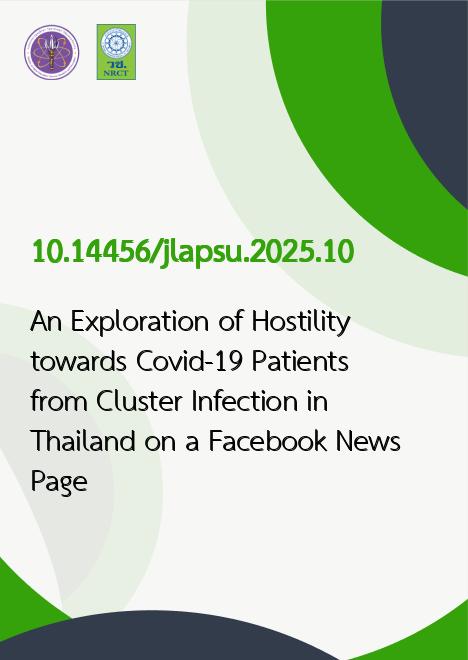
|
An Exploration of Hostility towards Covid-19 Patients from Cluster Infection in Thailand on a Facebook News Page |
|---|---|
| รหัสดีโอไอ | |
| Creator | Natthakieat Noknoi |
| Title | An Exploration of Hostility towards Covid-19 Patients from Cluster Infection in Thailand on a Facebook News Page |
| Contributor | Pattama Patpong |
| Publisher | Faculty of Liberal Arts, Prince of Songkla University |
| Publication Year | 2568 |
| Journal Title | Journal of Liberal Arts, Prince of Songkla University |
| Journal Vol. | 17 |
| Journal No. | 2 |
| Page no. | 286169, pp.1-29 |
| Keyword | Covid-19 Cluster Infections, Facebook News Page, Appraisal Theory, Hostility and Satisfaction, Facebook Comments |
| URL Website | https://so03.tci-thaijo.org/index.php/journal-la/index |
| Website title | Journal of Liberal Arts, Prince of Songkla University |
| ISSN | 2651-1126 |
| Abstract | The imposition of quarantine during the Covid-19 pandemic led to increased social media use to stay updated on infection levels. It was reported that the virus had spread through cluster infections resulting from quarantine violations. Consequently, social media users expressed their feelings towards the infected group in these clusters through evaluative language. This study aims to investigate the expression of hostility towards COVID-19-infected individuals from cluster infections in Thailand. The data comprised44clauses extracted from comments on 11 posts about cluster infections in Thailand on the official Facebook page of the Thai news TV program Rueang Lao Chao Niduring 2020-2021. The ATTITUDE system in Martin and White’s (2005) Appraisal Theory was employed to analyze the data. The findings showed a co-occurrence of hostility and satisfaction in comments directed at infected people who violated the quarantine guidelines. Hostility was expressed by Facebook users in the extremity of violence. Satisfaction was invoked based on the belief that these infected people should be removed by violent methods so that infection levels in the country would decline. The findings of this study contribute to designing better communication content in the digital era for future pandemic crises to prevent stigmatization and hate speech towards patients. |